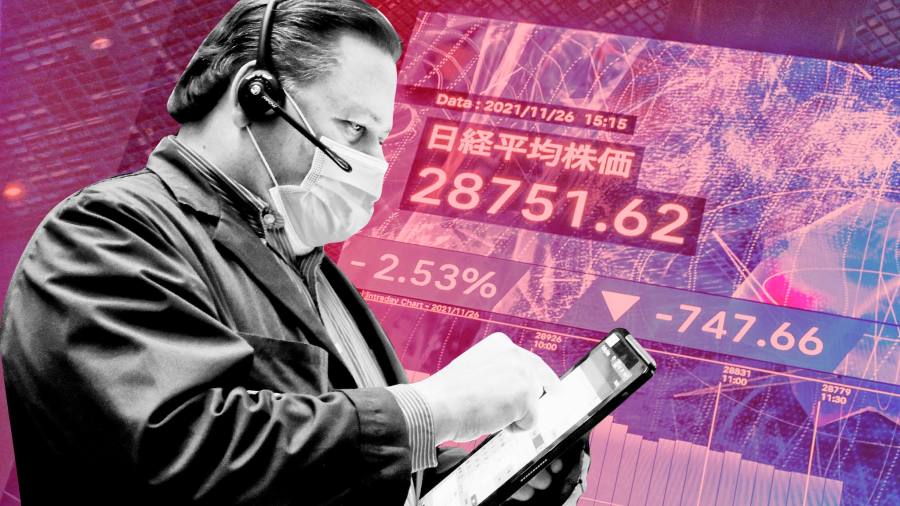Investors have spent the past year learning to relax about the pandemic, lulled by abundant stimulus and expectations that vaccines would keep the virus in check. That sense of calm was shattered on Friday.
Global stock markets tumbled by the most in a year, shaken by the discovery of a new coronavirus variant in Botswana which was found to be spreading elsewhere. Many investors had, until this point, shrugged off rising infection numbers in various countries — and the reimposition of travel bans and lockdowns in some — but Friday’s news rattled that confidence.
“A more virulent mutation has always been a risk but one which the market has been prepared to look through,” said Michael Metcalfe, global head of macro strategy at State Street. “Whatever happens now the market is going to be a little bit more wary and watchful of the Covid narrative.”
The market reaction was swift and severe. The FTSE All World index shed 2.2 per cent in its worst day since October 2020 with bourses in the US, Europe and Asia sustaining a bout of heavy selling pressure.
“The market wasn’t pricing this in. In the list of investor worries, Covid had fallen relatively far down,” said Paul Leech, co-head of global equities at Barclays.
“Talking to clients, there is a feeling that they don’t have enough information about this yet, so I don’t think people will put a meaningful amount of money to work until after the weekend and we know more.”
Investors and analysts stressed that the sharpness of the moves was exacerbated by how many people on Wall Street would have taken Friday off, and an unwillingness for the skeleton crews remaining at their desks to take on risk ahead of the weekend.
“You got a piece of news hitting markets at the worst possible time . . . Markets are completely illiquid thanks to the US holiday,” said Mark Dowding, chief investment officer at BlueBay Asset Management. “It’s a nasty Thanksgiving hangover.”
Bond markets, which have recently fixated on the potential for early interest rate rises as central banks battle stubbornly high inflation, also made a sharp change in course. Government debt rallied strongly as investors sought a safe harbour and dialled back some of their expectations for monetary tightening next year.
The US 10-year yield fell by 0.16 percentage points to 1.49 per cent, its lowest in more than two weeks. Yields in Europe also dropped sharply.
While high-grade government bonds rallied as investors sought out their safety, corporate debt markets were shaken by concerns that coronavirus would continue to weigh on economic activity and hurt borrowers’ ability to repay their debts.
Both BlackRock and State Street’s junk-bond exchange traded funds — which manage a combined $27bn — fell more than 0.7 per cent in New York to trade at their lowest point since November last year.
Despite the potential threat of a coronavirus variant that may be able to evade vaccines, investors said it was far too early to fundamentally reassess their outlook for the coming year.
Rather, they argued that many of Friday’s moves marked a reversal for popular trades as fund managers were forced to cut risk from their portfolios amid the sudden burst of volatility.
For example the dollar — which typically benefits during times of economic strife — gave up some of its recent gains against the euro and the yen. For stock markets, the losses marked a setback following a strong run, and traders said the decline was orderly.
“The moves are obviously very big, but you have to remember we are still close to all-time highs in a lot of risky asset prices,” said Mike Riddell, a portfolio manager at Allianz Global Investors. “It’s not as if the market is telling us we’re heading back into recession.”
Barry Norris, founder of Argonaut Capital, argued that it was too soon to position for a deeper stock sell-off. “The knee-jerk reaction is too obvious a trade,” he said. “Next week a vaccine company will say their jab works on the new variant and you’ll get whipsawed all over again”.
For now, investors are nervously awaiting further data on the new variant, an unwelcome throwback to the early stages of the pandemic when fund managers spent hours poring over infection rates.
“We’re kind of back to where we were more than a year ago,” said Metcalfe. “The market is going to be waiting on lab results again, which I think is something we thought we’d gotten past”.

